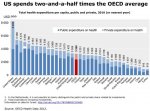- Joined
- Nov 20, 2013
- Messages
- 65,348
- Reaction score
- 49,382
- Gender
- Male
- Political Leaning
- Other
ok, i'll map it out for you.
and....
View attachment 67206490
the take home is that the VA is an offshoot of an organization that is designed to plan and engage in military actions ordered by politicians, not a properly funded universal health care system. the health care systems in Canada and Europe are a more direct comparison.
The VA is an example of how the US federal government performs in the healthcare providing role. There are no military maneuvers in the VA. Military personnel happen to be the patient population. "VA is an offshoot of an organization that is designed to plan and engage in military actions" has no bearing I can see on the healthcare provided. Please demonstrate if otherwise.
You state that "the health care systems in Canada and Europe are a more direct comparison". Canadian and European governments aren't the US government.
In the VA, as will be in any US federal government provided healthcare, be it single payer or be it socialized medicine, the key point, which you also identified, is the involvement of the US federal government, and therefore the bureaucracy, the bureaucrats, as well as the politicians. A fundamental formula for disastrous results, as have been amply demonstrated by the US federal government performance in the running of the VA.
Why would changing the patient population make such a difference? When the same US federal bureaucracy, the same US federal bureaucrats, as well as the same US federal politicians are involved? Just because?

